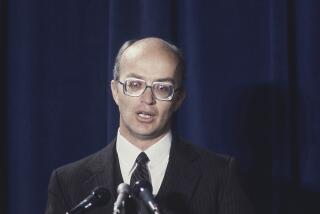Watt Denies Selling His Influence : In Angry Testimony, Calls HUD Consultant Role ‘Legal, Moral’
- Share via
WASHINGTON — Former Interior Secretary James G. Watt testified Friday that as a consultant he and a partner made $300,000 for arranging a meeting with one of Watt’s former Cabinet colleagues that led to the approval of a federal housing grant. But he denied that he abused the grant program through his influence.
Angrily denying accusations by members of a House subcommittee that he engaged in influence peddling, Watt contended that the Department of Housing and Urban Development was paralyzed by indecision and said it took his efforts to break the logjam on his client’s project.
‘I Am Proud of It’
“My participation was legal, moral and effective,” Watt told the House Government Operations Committee’s housing subcommittee. “And I am proud of it.”
Panel Chairman Tom Lantos (D-San Mateo) strongly disagreed. He told Watt: “This project came into existence because of influence peddling by you.”
Watt testified at a hearing held in connection with a recent HUD inspector general’s report, which concluded that a HUD program for rehabilitating low-income housing units was corrupted by favoritism during the Ronald Reagan Administration. It charged that developers who hired prominent Republicans as consultants won contracts for projects, while applicants who did not have connections often could get no funding.
Watt, once a leader in the so-called “sagebrush revolution” against the proliferation of federal government programs and activities, defended his role on behalf of a developer who had sought federal subsidies for a 312-unit housing project in Essex, Md.
He acknowledged that the $300,000 consulting fee “seemed like a lot of money to me,” and that his only service was setting up a meeting with Samuel R. Pierce Jr., then HUD secretary, to get the agency to consider the Maryland project and another developer’s proposal.
Watt said he gave $131,000 of the $300,000 fee to an associate.
Other former Reagan Administration officials have been convicted of illegally lobbying their former agencies within a year after leaving office. In Watt’s case, however, it was not against the law for a former secretary of Interior to lobby the head of a different agency--HUD.
“I am not saying you broke the law,” Rep. Christropher Shays (R-Conn.) told Watt. “I am saying to you this was a smelly system from which you benefited.”
Watt insisted that he was simply “a good man using his credibility to get a result.”
Rep. Bruce A. Morrison (D-Conn.) protested, saying: “There was no paralysis. You had influence. You were paid for your influence.”
Watt, who headed the Department of the Interior from 1980 to 1983, told the subcommittee that he had no experience as an attorney in housing matters when he took the consulting job for the developer. His access to Pierce, he agreed, was the key in prompting a review of the proposed federal grants that Watt said were blocked by bureaucrats.
He also insisted that he got his fees from the developer and not from federal money.
Jack Kemp, the former New York congressman who is now HUD secretary, has said the program appeared to be “based on the perception and reality of favoritism and abuse.”
Watt, however, challenged Kemp’s view, saying: “There was no abuse. There was no illegality. There was nothing done wrong.”
Rep. Barney Frank (D-Mass.) asserted that the government’s costs for rehabilitation projects go up if developers’ include their fees for consultants like Watt.
“While what he did was within the law, it wasn’t ethically attractive,” Frank said afterward. “And we got confirmation from him that under Ronald Reagan HUD was a disgrace. The vaunted Republicans were guilty of absolute inefficiency, but they also created a climate in which influence peddling was rife.”
At one point during the stormy hearing, Watt declared: “I’m not on trial. I’m not here to defend the system. The system was flawed.”
More to Read
Get the L.A. Times Politics newsletter
Deeply reported insights into legislation, politics and policy from Sacramento, Washington and beyond. In your inbox twice per week.
You may occasionally receive promotional content from the Los Angeles Times.









